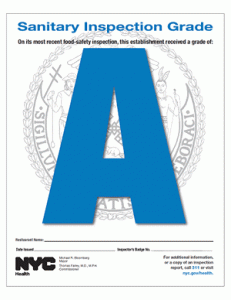 Nothing instills fear in the hearts of restaurant workers more than a visit from the health department. A failed inspection can be a death knell for even the most popular restaurant. In today’s world, it’s become a highly politicized process and—if you want to pass the test—you have to be prepared. Waitstaff and kitchen employees typically have a “fire drill” in place for when an inspector arrives. For the front-of-house this involves discarding anything that may trigger a deduction—wet rags that are used to crumb tables, fruit garnishes for cocktails, or any containers that aren’t labelled and dated. Meanwhile back-of-house scrambles to put on latex gloves and chef’s hats even though most of them weren’t properly outfitted when the inspector arrived. During the inspection, service grinds to a halt as the entire staff walks on eggshells to avoid missteps. Continuing to cook food only increases your chances of a violation, so the chefs lay down their knives. Oblivious diners stuck waiting for their food can only snack on our apologies until it’s over. The moment the inspector leaves, we put everything back where we need it to be: hats and gloves off, fruit garnishes exposed to the elements, and crumbing rags moist and ready. We know better than the Health Department what makes restaurants work properly and—while we respect their authority—everything runs so much better when they’re not around.
Nothing instills fear in the hearts of restaurant workers more than a visit from the health department. A failed inspection can be a death knell for even the most popular restaurant. In today’s world, it’s become a highly politicized process and—if you want to pass the test—you have to be prepared. Waitstaff and kitchen employees typically have a “fire drill” in place for when an inspector arrives. For the front-of-house this involves discarding anything that may trigger a deduction—wet rags that are used to crumb tables, fruit garnishes for cocktails, or any containers that aren’t labelled and dated. Meanwhile back-of-house scrambles to put on latex gloves and chef’s hats even though most of them weren’t properly outfitted when the inspector arrived. During the inspection, service grinds to a halt as the entire staff walks on eggshells to avoid missteps. Continuing to cook food only increases your chances of a violation, so the chefs lay down their knives. Oblivious diners stuck waiting for their food can only snack on our apologies until it’s over. The moment the inspector leaves, we put everything back where we need it to be: hats and gloves off, fruit garnishes exposed to the elements, and crumbing rags moist and ready. We know better than the Health Department what makes restaurants work properly and—while we respect their authority—everything runs so much better when they’re not around.
Help Me, Help You

If you are unhappy with your food or service, say so. Before you write off the restaurant completely, give management an opportunity to hear your concerns and make things right. Too often, diners let complaints fester and leave without saying a word to the staff. It’s understandable to feel apprehensive about complaining when the experience disappoints—you don’t want to be that guy—but why lie about it to a server when he asks if everything was ok? It’s unfair to withhold negative feedback in the moment and then leave a scathing Yelp review. But it happens all the time. In most cases, there is a staff of people who are on hand to ensure your happiness. We would prefer you tell us what’s wrong than to have you sit there acting all mopey. If you don’t communicate your issues, then you share responsibility for the failure of your dining experience. That said, there is a right and wrong way to do it. If you have a service problem, politely ask to speak with the manager. If the problem is with the quality of the food, tell the server you are sorry to be difficult and articulate your concerns. Most restaurants will be happy to replace the dish or bring you something else. Whatever we can do to make you leave impressed. It is impossible to fix a problem that we never even knew existed.
